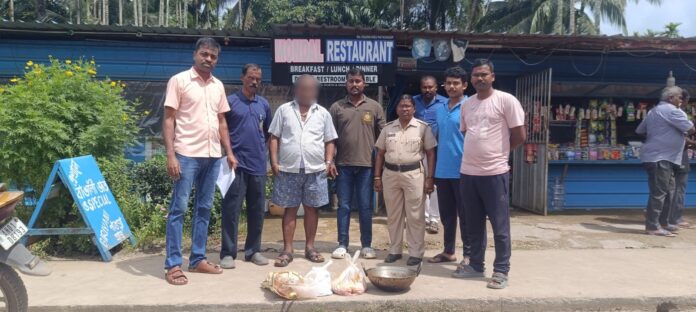The North and Middle Andaman District Police have intensified their campaign against illegal activities with a coordinated operation that targeted both illicit liquor and suspected wildlife meat. Conducted on September 14, the crackdown resulted in multiple seizures and fresh cases under excise and wildlife protection laws, underscoring the administration’s focus on maintaining law and order while safeguarding biodiversity.
The operation was carried out across Kadamtala Bazar, Uttara, Shantanu, and adjoining areas under the supervision of the Sub-Divisional Police Officer (SDPO), Rangat. Acting on intelligence inputs, police teams raided Mondal Restaurant and Bengali Restaurant in Kadamtala. During the search, authorities recovered approximately 10 kilograms of suspected wild boar meat and about 9 kilograms of suspected cooked venison, including the utensil weight. The recovered items were promptly taken into custody and handed over to the Forest Department under Section 50(1)(c) of the Wildlife (Protection) Act, 1972, for further legal action.
In addition to wildlife-related seizures, the police simultaneously launched action against the sale of illicit liquor in the district. Raids across Kadamtala Bazar, Uttara, Shantanu, and surrounding areas led to the recovery of 54 bottles of Indian Made Foreign Liquor (IMFL) of various brands and nine bottles of beer. As a result, five First Information Reports (FIRs) were registered under the Excise Regulation. Officials confirmed that all recoveries were sealed on the spot, videographed for evidence, and documented through seizure memos prepared in the presence of witnesses.

The coordinated nature of the raids highlights the district police’s zero-tolerance stance against illegal liquor distribution and wildlife crime. Both issues have significant implications: illicit alcohol poses risks to public health and safety, while wildlife poaching and trade threaten the fragile biodiversity of the islands. By targeting both simultaneously, the police have reinforced their commitment to comprehensive law enforcement.
According to officials, surveillance and follow-up operations will continue in the coming weeks to ensure that offenders are not able to regroup or re-establish illegal networks. The strategy includes maintaining a visible police presence, conducting surprise checks, and acting on intelligence provided by community members.
The role of public participation was also stressed during the operation. The police have appealed to residents to share credible information about illegal activities, assuring that the identity of informers will remain confidential. Informants may also be eligible for rewards, further encouraging community cooperation in maintaining law and order. Contact numbers for reporting crimes include 100, 112, and 03192-273344.
The crackdown also sends a strong signal to restaurant operators and local businesses about the legal consequences of engaging in the sale or storage of prohibited items. While the wildlife meat has been handed over to the Forest Department for necessary action, the excise cases will proceed under existing legal frameworks, with prosecutions expected to follow.
Wildlife poaching, particularly of species such as wild boar and deer, not only violates legal protections but also poses risks to ecosystems already vulnerable to human activity and climate pressures. Meanwhile, the availability of illicit alcohol has been linked to health risks and community disturbances.
The September 14 operation represents a consolidation of these enforcement priorities. By simultaneously addressing two distinct but significant illegal activities, the North and Middle Andaman Police have demonstrated a multi-pronged approach to crime control. For residents, the message is clear: such activities will be met with strict surveillance, raids, and legal action.
As operations continue, the administration aims to build on the momentum of this crackdown, reaffirming its stance on protecting both community welfare and the ecological integrity of the islands.





